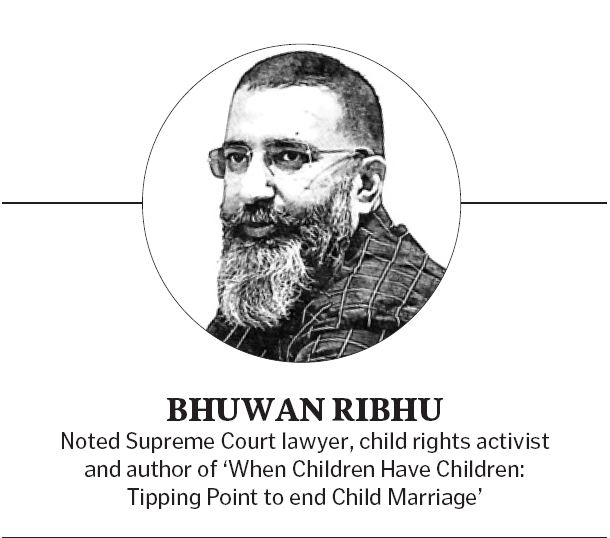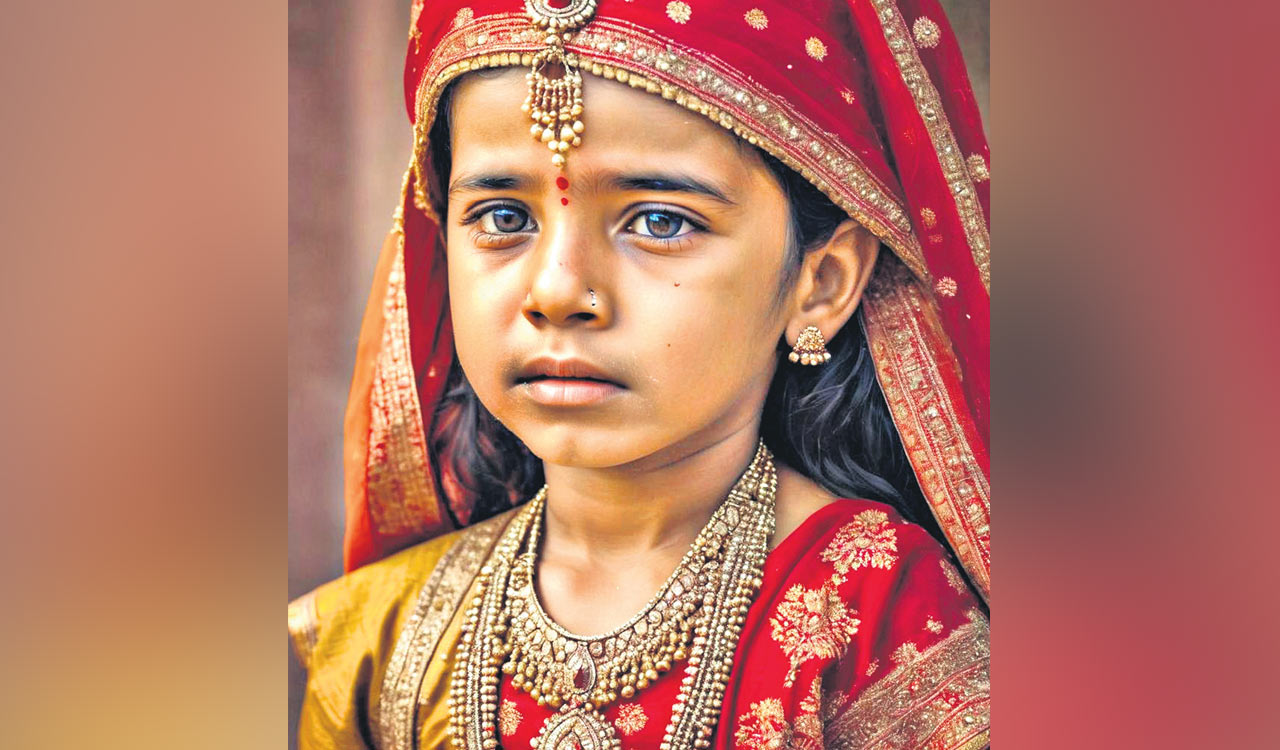Child marriage is a crime and anyone indulging in it needs to be prosecuted
Published Date – 2 February 2024, 11:45 PM

By Bhuwan Ribhu
Child marriage is child rape, and there is no euphemism that can cloak this crime as a mere social injustice. While the entire nation fares poorly on the issue of child marriage, with one out of every three child brides in the world living in India, there is a huge disparity among the Indian States as well. Andhra Pradesh, along with a few other States, has a much higher incidence of child marriage at 29.3 per cent, as against the national average of 23.3 per cent, according to the National Health Family Survey V (2019-21). Socially acceptable customs, limited access to education, parental fears of dowry and elopement, a sense of insecurity for adolescent girls and socioeconomic conditions — these challenging factors contribute to an ecosystem that not only allows child marriage to exist but also makes it thrive.
AP’s Initiatives
However, the recent initiatives by the government of Andhra Pradesh in eliminating child marriages are extremely laudable. The key to eliminating child marriage is an ecosystem-level approach where there is ample and adequate focus on preventing child marriages, behaviour change of people for the protection of children, and also understanding child marriage not only as an issue of social justice but also a crime.
On October 16, various government departments of Andhra Pradesh came together to put forward a unified approach and a strategy that showed the convergence of various fragmented approaches. So while the Education Department ensured that there was ample awareness among the children, the Panchayati Raj Department ensured that the parents were also made aware with every gram panchayat taking the pledge. In a path-breaking step, the Police Department became part of this campaign and took pledges, putting forth a new direction for the entire world to follow.
The fact that the Andhra Pradesh State Legal Services Authority and the Women Development and Child Welfare Department too have taken pledges and given much momentum to the process further corroborates the concerted action taken by the government community, monitoring agencies and civil society.
In Andhra Pradesh, the participation of children and their awareness generation, the participation of parents, legal deterrent in society, knowledge generation and capacity building of responsible agencies, functioning of monitoring agencies to ensure that accountability is ensured – these indicators represent a well-structured model against child marriage. The fact that the government of Andhra Pradesh has demonstrated ample political will to implement these elements is a step in the right direction.
PICKET Strategy
This cohesive approach is much in line with the PICKET strategy prescribed by yours truly in the book ‘When Children Have Children: Tipping Point to End Child Marriage’. The PICKET strategy, which would accelerate multifold the process of curbing child marriage, entails:
- Policy addressing prevention, protection and prosecution
- Investment in infrastructure, incentivisation and institutions
- Convergence of departments, governments and stakeholders in the community
- Knowledge that empowers all stakeholders to curb child marriage
- Ecosystem that does not let child marriage thrive
- Technology as a solution to monitor, detect and deter child marriage
Recognising education as a crucial tool in curbing child marriage, the State government has introduced some strategic schemes. Notably, the YSR Kalyanamasthu Scheme and the Shadi Tohfa Scheme, backed by a substantial allocation of Rs 141.60 crore, offer financial aid to support the weddings of girls from economically disadvantaged families and other vulnerable categories. Significantly, the requirement for girls to have completed at least Class 10 to qualify for these schemes ensures a focused approach.
In yet another move, the State government has also taken a stern stance against families involved in child marriages. Those known to have conducted such marriages are rendered ineligible to benefit from any government welfare schemes, sending a strong message against this crime.
Lack of strict law enforcement is one of the root causes of continuing child marriage, and rigorous law enforcement and prosecution of the offenders are critical deterrence mechanisms to overturn the lethargy in dealing with child marriages. Disha Police Stations, the model stations aimed at rendering speedy justice for female victims of sexual assault (rape), harassment, and the Protection of Children from Sexual Offences (POCSO) Act, 2012, is an extremely significant step in this direction.
As many as 34 child marriages were prevented by Disha police in the last two months in various districts across the State. A minor girl in a village in Elluru district made an SOS call to Disha helpline and asked to be rescued from her marriage three days later. The police promptly took action and stopped the marriage, thus not just rescuing the child but also building both the confidence of society as well as an ample deterrent for the offenders.
Biggest Ask
Now the biggest ask is a clear message that child marriage is a crime and anyone indulging in it needs to be prosecuted, and there should be statewide drives; otherwise, the awareness generation would remain insufficient.
Secondly, there is an urgent need to involve religious leaders from all religions in this cause to ensure behaviour change. These two factors, combined with the work already being done in the State, require a budgeted action plan that will give much sharper teeth to eliminate child marriage from the State.
Andhra Pradesh has taken significant strides in the battle against child marriage, but the war is far from over. The fight demands more than just applause; it demands active participation and collective determination at all levels and strata. Let us unite in a resounding call to action. Advocate for stringent laws and their unwavering enforcement. Demand that child marriage be recognised as the crime it is, not a mere social ill. Support initiatives that empower young girls through education and financial aid.
This is not just Andhra Pradesh’s battle; it’s a call to arms for the entire nation. Stand against child marriage with unwavering resolve. Let us be the generation that eradicates this heinous practice, ensuring every child has the right to a childhood, free from the chains of early marriage.
(The PICKET strategy prescribed in the book has now been adopted by NGOs across the country in their fight to eliminate child marriage)





